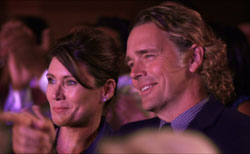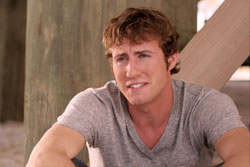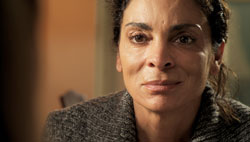In 2011, pro-life advocates saw record political surges advancing their cause, and states adopted 80 abortion restrictions in their legislative sessions. Europe’s top courts have also shown increasing support for pro-life causes. It’s into this political atmosphere that brothers Jon and Andrew Erwin bring October Baby, their first foray into directing a feature film.
The film begins on a stage; 19-year-old Hannah (Rachel Hendrix) has the lead role in her first college play. But just a few lines into the opening scene, Hannah collapses on stage. In the aftermath, Hannah learns the truth behind her strange medical history: her parents adopted her, as an extremely tiny and vulnerable premature infant, after she survived a botched abortion.
Even before this earth-shattering revelation, Hannah feels out of place. In her journal, she writes about how she feels “dead inside,” how she doesn’t deserve to live, and how she’s just a “child trying to find a place in this world.” The revelation only amplifies these feelings, and it severely strains her relationship with her parents, Jacob (John Schneider) and Grace (Jennifer Price).

Hannah determines to track down her real birth mother, but her only information is that she was born in Mobile, Alabama. When her best friend Jason (Jason Burkey) finds out, he invites her along on the spring break trip he’s planning to take with his college friends. They’re heading to New Orleans, but they can stop in Mobile on the way. Against her father’s wishes, Hannah joins the trip.
What follows is a pretty stereotypical roadtrip—a bunch of friends piled into an old Volkswagen van, an encounter with an overeager cop on a private beach, and adventures in finding hotel rooms affordable for broke college students. Ultimately, Hannah and Jason separate from the group and track down the clinic where Hannah was born and, eventually, Mary (Jasmine Guy), the nurse who helped with both the botched abortion and the eventual birth. In the course of the conversation, Mary reveals one final twist in the saga of Hannah’s birth—the final, devastating secret her parents kept from her. Mary also gives Hannah the information she’s been searching for: the name and location of her birth mother.
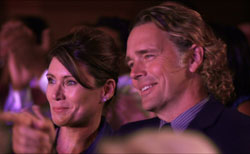
But when Hannah finally finds her birth mother, it doesn’t bring the peace or closure she seeks; instead, her birth mother rejects her. Hannah returns home just as lost and broken—if not more so—than when she left. It isn’t until she wanders into a cathedral and speaks with a priest about her feelings that she can begin to forgive her parents, her birth mother, and herself.
The danger of a film focusing on the effects of abortion lies in its potential for political heavy-handedness, but the Erwin brothers successfully navigate around that. October Baby is a coming-of-age film, not propaganda disguised as a docudrama. The film is pro-life, no doubt, but the story focuses on Hannah’s journey to find her place in this world and on the power of forgiveness.
Throughout the first two acts, references to faith are subtle; in fact, most of the faith imagery lies in the music and the character names, rather than the dialogue. It isn’t until Hannah meets Mary that we see how much of a role faith played in Jacob and Grace’s journey to adopt Hannah. And again, it isn’t until Hannah talks with the priest about forgiveness that we see how much of a role faith has—and will—play in her life. The subtlety of that faith makes that moment in the cathedral, and the moment where Hannah is faced with the opportunity to forgive her birth mother, all the more powerful.
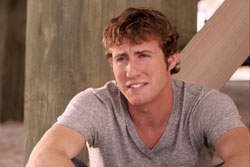
The cast, most of whom are relatively unknown, all pull off strong performances. Hendrix performs admirably in her first starring role. Burkey nails the role as a supportive best friend (who, predictably but still enjoyably, becomes a romantic interest). Schneider proves once again that he’s well-suited to play a paternal role, and Guy’s performance as Mary, though brief and quiet, is perhaps the most powerful of all.
But there are weak points. The Erwin brothers are known for their award-winning music videos (Amy Grant, Switchfoot, Casting Crowns, Michael W. Smith), and while the film itself is admirable, the music video vibe is pervasive. Several transition scenes are set to music, and the whimsical lighting, camera angles, and cuts give those scenes a music-video feel that, at times, feels a little cheesy. Some of the attempts at humor fall flat, and one awkward motel room conversation about abstinence feels out of place.
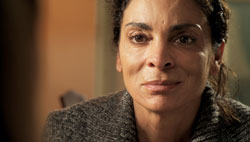
But the movie’s strengths outweigh its weaknesses. The emotional strength and well-paced unfolding of the story leads to a powerful catharsis for both the characters and the audience. October Baby‘s greatest strength, however, stems not from its message, its actors, or its directors, but the reminder of the incredible power of forgiveness—and the impact it has on so many broken lives.
Talk About It
Discussion starters- A major theme in the film is the power of forgiveness. How have you witnessed this power in your life? Are there people you need to forgive? If you were in Hannah’s shoes, could you have forgiven your parents? Your birth mother? Yourself?
- When Hannah learns of the secrets her parents were keeping from her, she was angry and upset. But her parents were doing what they thought was best for her. Are there times where secrets should be kept, or should the truth always be told, even if it hurts people?
- Hannah struggles with self-esteem throughout the film, often feeling like the things that happened to her are her fault. Do you know someone who struggles with these things? What causes these thoughts? What can you do to remind them of their value as someone created by God?
The Family Corner
For parents to considerOctober Baby is rated PG-13 for mature thematic material. There is much talk about abortion and botched abortion; though there are no pictures or images of abortion, there are mildly graphic descriptions about the damage done by the botched abortion.
Photos © Provident Films
Copyright © 2012 Christianity Today. Click for reprint information.



